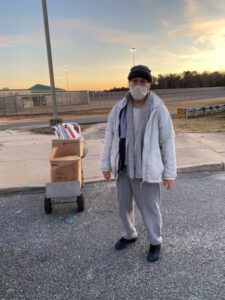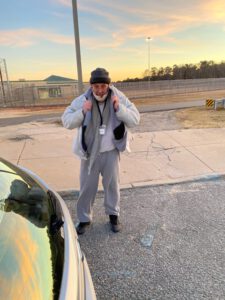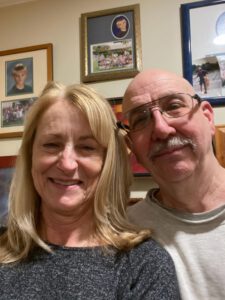This article by Sara Brittany Somerset was originally published on Cannabis & Tech Today, and appears here with permission.
Polarizing former President Donald Trump pardoned pot prisoners during his last remaining hours in the office, around midnight on Wednesday. The move went largely unremarked upon by the mainstream media, who had a field day reporting mostly on the bold names on the presidential pardon list; many belonging to Trump’s frenemies, including Steve Bannon, and notorious rappers, including Lil Wayne. Flying under the radar were “cannabis lifers” with compelling stories, such as Mr. John Knock.
Knock received clemency, causing his sentence to be commuted to time served.
According to the White House, President Trump commuted Knock’s sentence. “This commutation is supported by his family. Mr. Knock is a 73-year-old man, a first-time, non-violent marijuana only offender, who has served 24 years of a life sentence. Mr. Knock has an exemplary prison history, during which he completed college accounting classes and has had zero incident reports.”
Prisoners are sitting ducks amid the Novel Coronavirus pandemic. As such, attorneys for non-violent cannabis offenders are emphatically appealing for their release.

Knock preparing to head home after serving 25 years in prison for marijuana crimes.
As reported in Forbes, Knock’s draconian sentences were handed down two decades ago by the District Court of the Northern District of Florida. Since those harsh sentences were administered, marijuana is legal for adults in 11 states, and in Washington D.C. Medical marijuana is legal in 34. Meanwhile, New Jersey, Arizona, Montana, and South Dakota voted to legalize adult-use marijuana in November’s elections. Additionally, Mississippi and South Dakota voted in favor of a medical cannabis program.
In a motion filed last year by a New York-based chapter of the National Organization to Reform Marijuana Laws (NORML), Empire State NORML’s Executive Director David C. Holland, Esq., sought relief for Knock from the federal sentencing District Court under the First Step Act.
Signed into law by President Trump on December 21, 2018, the Act is the culmination of a bipartisan effort to improve criminal justice outcomes.
The First Step Act expanded avenues for eligible elderly and terminally ill prisoners to get their sentences reduced by allowing for their motions to be directly filed with the courts. The Act authorized eligible low-risk and elderly inmates to be transferred to home confinement when possible.
According to Holland, this motion was filed after the Warden’s untimely rejection of Knock’s request for compassionate release based on his age, deteriorating health, changes in the enforcement of the federal Controlled Substances Act, and modern sentencing trends.
Holland argues that Knock’s extreme sentences were the result of the “trial penalty” or sentencing enhancement for having forced the Government to go to trial to prove its jurisdiction over the case and the quality of the co-conspirator/cooperating witness evidence against him.
Others charged in the same conspiracy, who pled guilty rather than proceed to trial, were released with sentences as minimal as three years.
Knock’s motion argues that the sentences were driven by a vindictive government and the inflexibility of the mandatory federal sentencing guidelines which militate life sentences.
Holland further argues that since that time, the sentencing guidelines are advisory and those federal sentencing policies are far more lenient due to state-based commercial, albeit federally illegal, cannabis distribution programs. Graphs and charts developed by the U.S. Sentencing Commission elucidate that modern-day, first-time offenders receive average sentences of fewer than 10 years – a far cry from the 24 years that Knock has already served.
The motion also charts out that notorious marijuana dealers involved in other distribution conspiracies received more lenient sentences.
For example, Howard “Mr. Nice” Marx faced or received a moderate sentence of 10 years or less for pleading guilty to charges, despite being dubbed “the world’s largest distributor” or having engaged in the “world’s biggest” conspiracy.
Knock’s First Step Act motion argues that it is time for District Courts to immediately reduce the sentences of cannabis crime lifers in order to reverse the ‘trial penalty’ and to fall into line with modern sentencing trends. In Knock’s case, he sought to be re-sentenced to time served.
Holland argued that given the government’s modern tolerance of state cannabis programs, more lenient sentencing trends, and empowerment of the federal District Court’s to entertain such humanitarian motions – after all other post-conviction and administrative remedies have failed – should prompt the Northern District of Florida to grant the motion and release Knock before COVID-19 becomes a serious threat and causes his untimely and unnecessary demise.
This motion echoes the words of Knock’s trial counsel, the late, formidable Michael Kennedy, “No one should do life for pot!”
Kennedy, a former mentor and later colleague of Holland’s, would doubtlessly be proud of his efforts to continue the fight. All five elderly, first-time offender “marijuana lifers” for whom the two attorneys petitioned President Obama for group clemency in 2012, have had their sentences commuted. Knock was the last member of that group. Winning five for five with a group petition is extremely rare and solidified Holland’s reputation as a career cannabis criminal defender.
As humble as he is hardworking, Holland credits Knock’s sister for helping him to gain his client’s freedom.
“John’s release could not have been achieved without the tireless and determined efforts of Beth Curtis and the many advocacy groups that picked up his cause in the now successful efforts to bring him home.”

Knock pictured shortly after his release from prison.
“These sentences are not fiscally responsible and are not just,” says Curtis. “As marijuana becomes legalized to some degree in more and more states and cannabis businesses receive billions in investments, the injustice associated with caging nonviolent people behind bars for decades for cannabis becomes a cruel irony.”
One advocacy group that was supportive of Knock’s release, the CAN-DO for Clemency Foundation, run by pardoned prisoner Amy Povah, got Michael Pelletier, who is paraplegic, out of prison by writing his clemency petition. Povah was part of the informal committee for clemency with the Trump administration.
“I submitted Craig Cesal, Jimmy Romans Michael Pelletier, and a few others but those three were granted,” says Povah via email. “Michael is the only one whose entire petition I wrote during the Obama administration that remained pending. I re-wrote his petition for Trump.”
Knock credits Trump, in addition to his attorney, David Holland, who worked his case pro bono for nine years, for his release.
“In the last election cycle, I was turned down for commutation. On the same day, I was listening to an NPR program talking about legalizing marijuana in Pennsylvania,” Knock said in an exclusive interview with Cannabis & Tech Today.
“People look at the person who just left office in a bad light, but he and Jared Kushner have done more for the prison population than anyone else. Say what you want about him; he has a crass personality and you might not want him as a dinner guest, but he created the First Step Act. The Trump administration brought this to the forefront. Maybe I have tunnel vision, but it worked for me. Trump got me out.”
“Now I can hug my wife and kiss her without having a corrections officer think we are passing drugs,” Knock continues.
Driving home from prison, Knock had never seen electronic billboards before, “a moving map in a phone,” or an iPhone. He is in for a significant readjustment to modern society.

John Knock’s was released from prison today. Pictured here at home with his wife Naomi.
His initial thoughts on re-entering the civilian population?
“I’m glad that it’s over,” he says in an upbeat voice, with his dedicated wife Naomi by his side. “I can walk from room to room in my house. That’s a huge difference from living with two to three men in a 12×12 room for the past 25 years.”
Knock’s son is flying in from Seattle. He hopped a flight as soon as his dad was released.
“I haven’t hugged my son since he was three years old and now he is 30,” Knock says. It is time for the entire Knock family to get reacquainted.
“The loss of a beloved nonviolent family member causes pain that is indescribable and destroys families. When these sentences are not consistent with the changing climate of legalization respect for the rule of law is destroyed,” insists Beth Curtis.
White-collar embezzlers and rappers notwithstanding, the cannabis community is collectively relieved that a handful of pot prisoners including John Knock, are finally out of the joint.
Trump granted pardons and commuted the sentences for thirteen marijuana prisoners.
They are:
- Lynn Barney (pardon)
- Jonathon Braun
- Craig Cesal
- Corvain Cooper
- Anthony DeJohn
- Noah Kleinman
- John Knock
- Way Quoe Long
- Michael Pelletier
- James Romans
- Ferrell Damon Scott
- Brian Simmons
Each person was sentenced to life in prison for marijuana or marijuana conspiracy offenses, except for Braun, Kleinman, and Simmons.
Read the original Article on Cannabis & Tech Today.
Benzinga's Related Links:
© 2025 Benzinga.com. Benzinga does not provide investment advice. All rights reserved.
Trade confidently with insights and alerts from analyst ratings, free reports and breaking news that affects the stocks you care about.
Cannabis is evolving—don’t get left behind!
Curious about what’s next for the industry and how to stay ahead in today’s competitive market?
Join top executives, investors, and industry leaders at the Benzinga Cannabis Capital Conference in Chicago on June 9-10. Dive deep into market-shaping strategies, investment trends, and brand-building insights that will define the future of cannabis.
Secure your spot now before prices go up—this is where the biggest deals and connections happen!